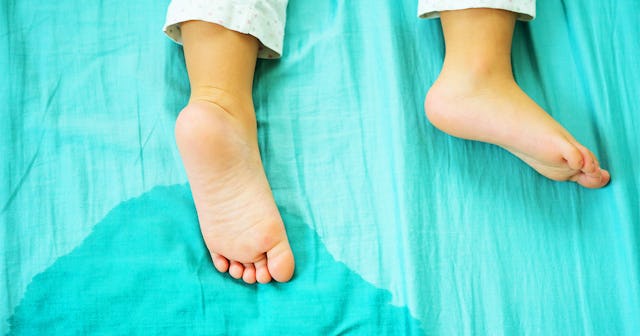Why You Shouldn't Worry Too Much About Bedwetting In Older Kids

My oldest child was potty trained fairly easily, and her body figured out how to wake her in the night if she needed to pee soon after she started wearing underwear during the day. It was so nice to have one out of three kids no longer in diapers and Pull-Ups that I didn’t even consider if, at barely four years old, she was early or late to wake up dry each morning.
But then her twin siblings turned four, then five, and they were still wetting the bed at night — and I worried they were behind schedule. By the time my son was six, he was out of Pull-Ups but his twin was not, and it bothered her. As a family, we talked about how our bodies do things when they are ready and hers just wasn’t ready to wake up in the night to pee yet—it was okay.
Admittedly, I was worried about her bedwetting, but have been consistently reassured by friends and our pediatrician that she will outgrow it and that’s more common than people talk about. I didn’t let my daughter in on my worry, but I have reassured her of these things too. She’s now seven and a half and still wets the bed, but we’ve both learned not to stress about it. She would rather not need a Pull-Up, but no one is putting pressure on her to stop wearing them. She gets embarrassed sometimes, but I never want her to feel shamed for something she can’t control. And the number of laughs she gets for wearing a clean Pull-Up on her head like a chef’s hat seems to take the sting out of her embarrassment.
When bedwetting happens in children over the age of five it’s called nocturnal enuresis, and there are two types: primary enuresis is when a child hasn’t ever stopped wetting at night, and secondary enuresis is when a child reverts to bedwetting after at least six months of nightly bladder control. Up to 10% of kids seven-year-olds still wet the bed, and between 1% and 3% of teenagers still have accidents at night. Primary enuresis is much more common and is usually a delay in development in the bladder, kidney, or brain. Some kids just have a small bladder or the inability to wake up when their bladder is full. They need longer to grow and make these connections.
Bedwetting in older kids experiencing secondary enuresis should be evaluated by a doctor because it could be a sign of stress, urinary tract infection, or neurological issue. Genetics could be a factor too. If one biological parent wet the bed, there is a 50% chance their child will wet the bed after the age of five. If both biological parents were bedwetters, the percentage increases to 75%. Before you get too frustrated or worried about your kid’s wet nights, try to think about how old you were before you stopped peeing at night. Your kid may have inherited your bedwetting gene in addition to the color of your eyes.
Peter Dazeley/Getty
There are medications that can stop bedwetting, but when the medications are stopped, the bedwetting usually returns unless a child has outgrown nocturnal enuresis. My daughter’s doctor mentioned that some parents try bedwetting alarms, and research shows that half of kids and families who use them properly see success. Over time the brain associates the alarm with the need to pee because it goes off at the first indication of urination, but it’s imperative to get the kid up and out of bed every time the alarm goes off in order for this lesson to be learned.
Our pediatrician also suggested limiting my daughter’s beverage intake an hour before bed, making sure she pees right before sleep, and waking her up to get her to pee again before I go to bed. This may help train her bladder, but it will also reduce the amount of pee that accumulates in the Pull-Up, which will reduce the chance that she pees through her Pull-Up and onto her sheets and blankets. Admittedly, I haven’t tried waking her up once she’s asleep. She doesn’t want me to and I’m not motivated to wake a kid up who struggles to get back to sleep.
It sucks to still be paying money for Pull-Ups, and doing extra laundry is the last thing I need, but I’m not going to make my kid feel like shit because she is a little behind her siblings and some peers. Just like with shoe tying and daytime potty training, kids will learn when they’re ready. Since talking about my older bedwetter with others, my worry continues to go away. Some parents have explained that their 10-year-olds were still struggling with staying dry through the night but then one day they just outgrew it. If your child doesn’t stop wetting the bed by the time they are teenagers, be sure to consult with a doctor — but you will likely just need to trust your child’s body’s process.
My recommendation is to get a couple of good waterproof mattress covers and find a solution that works for you and your child. Depending on your child’s level of discomfort or desire to stop wetting the bed, they may want to try something more than just waiting to outgrow it. But for the kids who don’t seem to mind wearing a Pull-Up or nighttime underwear, support them in that too. Adding pressure, stress, and expectations they can’t meet will only add to what you think is a problem.
This article was originally published on